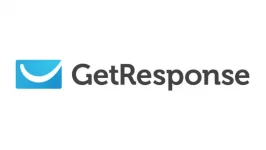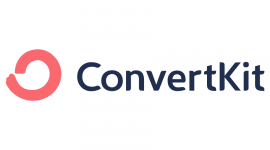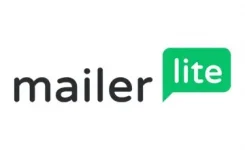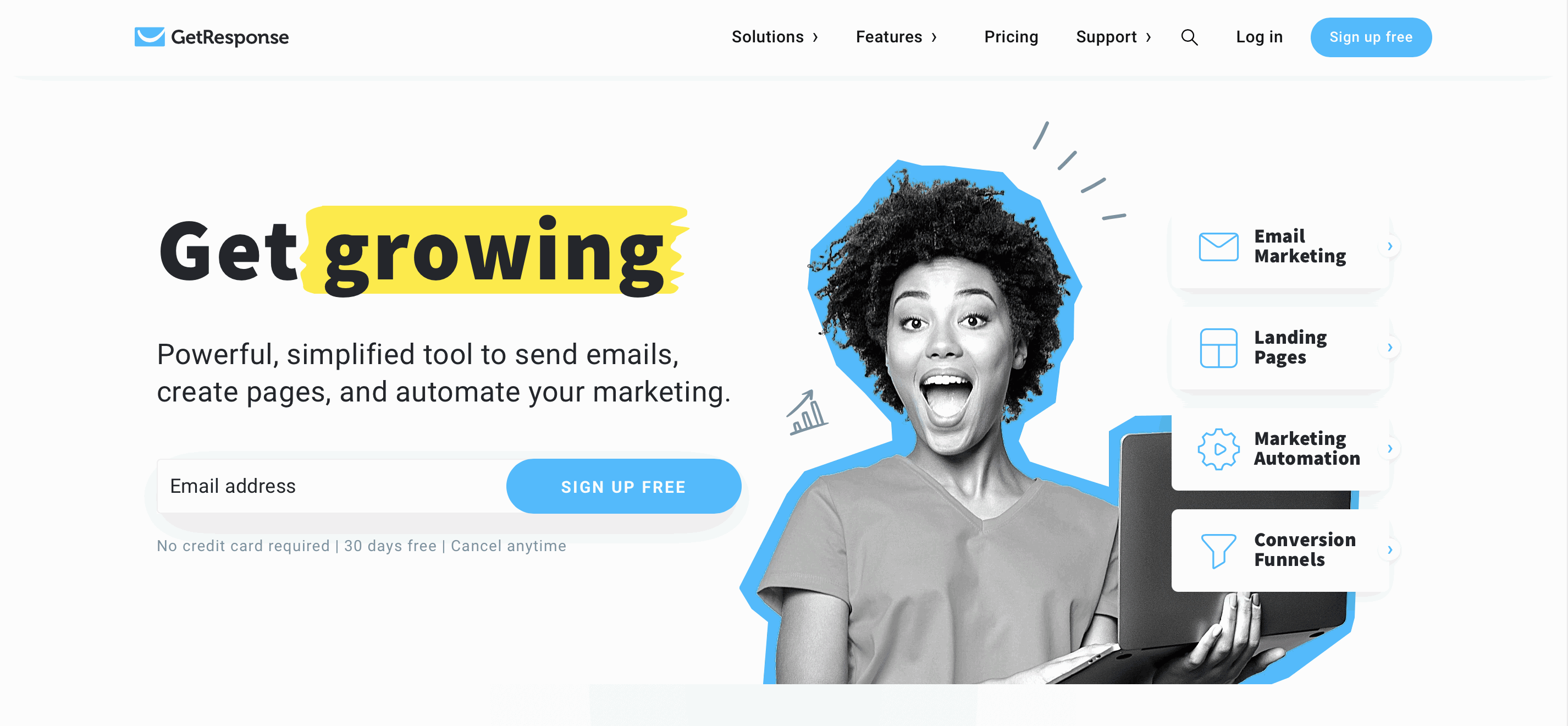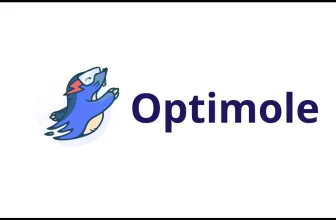How does Mailchimp Work
Mailchimp is a cloud-based email marketing platform that allows businesses and individuals to create, send, and track email campaigns to their subscribers.
With its user-friendly interface and a wide range of features, Mailchimp has become one of the most popular email marketing tools in the industry.
Its features include customizable email templates, segmentation options, automation workflows, A/B testing, and analytics.
Mailchimp Pros and Cons
Mailchimp Templates
Just like most email marketing autoresponders, Mailchimp provides well-designed and structured email templates and landing page templates for the most popular industries online.
All you have to do is pick the one that suits your business better and start editing the Mailchimp email templates.
Mailchimp provides more than 100 predesigned templates that you can use in the free plan and paid plans.

Mailchimp Features
Contact management
With Mailchimp, you can manage your contacts and subscribers, segment your list based on different criteria such as location, interests, and behavior, and import and export your contact lists.
Email campaigns
You can create and send email campaigns to your subscribers using Mailchimp’s easy-to-use drag-and-drop email builder. You can also automate your email campaigns using workflows and triggers.
A/B testing
Mailchimp’s A/B testing feature allows you to test different variations of your emails to see which one performs better.
Analytics
Mailchimp provides detailed analytics on your email campaigns, including open rates, click-through rates, and conversion rates. You can also track your subscribers’ behavior and engagement with your emails.
Social media integration
Mailchimp allows you to integrate your email campaigns with social media platforms, such as Facebook, Instagram, and Twitter, to reach a wider audience.
E-commerce integration
Mailchimp integrates with e-commerce platforms, such as Shopify and WooCommerce, allowing you to create and send targeted email campaigns to your customers based on their purchase history and behavior.
Mobile app
Mailchimp offers a mobile app that allows you to manage your email campaigns, track your analytics, and access your contact lists from your mobile device.
Custom branding
You can customize your email campaigns with your brand colors, logo, and images, ensuring that your emails align with your brand.
Security
Mailchimp offers advanced security features, including two-factor authentication, encryption, and compliance with privacy regulations such as GDPR and CCPA.
These are just some of the key features that Mailchimp offers. Depending on your plan and subscription level, you may have access to additional features, such as advanced segmentation, retargeting ads, and more.
Mailchimp Pricing

Mailchimp pricing plans range from a free plan to advanced plans with more features and higher subscriber limits. Here is a breakdown of Mailchimp’s pricing plans:
Mailchimp free plan
Mailchimp’s Free plan allows you to send up to 1000 emails per month to up to 500 subscribers. This plan includes access to basic email templates, marketing CRM, and an audience dashboard.
Essentials plan
Mailchimp’s Essentials plan starts at $11 per month and allows you to send up to 5000 emails per month to up to 1500 subscribers. This plan includes access to more advanced email templates, A/B testing, custom MailChimp branding, and 24/7 email and chat support.
Standard plan
Mailchimp’s Standard plan starts at $17 per month and allows you to send up to 6000 emails per month to up to 500 subscribers. This plan includes all the features of the Essentials plan, as well as advanced segmentation, retargeting ads, and more detailed reporting.
Premium plan
Mailchimp’s Premium plan starts at $299 per month and allows you to send unlimited emails to up to 150000 subscribers. This plan includes all the features of the Standard plan, as well as multivariate testing, advanced segmentation, and phone support.
In addition to these plans, Mailchimp also offers a pay-as-you-go pricing option, where you can purchase email credits that can be used to send emails to your subscribers. The Mailchimp cost per email credit varies depending on your plan and the number of credits you purchase.
It’s worth noting that Mailchimp’s pricing is based on the number of subscribers you have, so if you have a large list, you may need to upgrade to a higher pricing plan to accommodate your subscribers. However, Mailchimp also offers a range of features that can help you manage and segment your list more effectively, which can help you make the most of your subscription.
Mailchimp Support
Mailchimp’s customer support has received mixed reviews from users. Some users have found their customer support to be helpful and responsive, while others have experienced slow response times and unhelpful responses.
Mailchimp offers several ways to contact its support team, including email support, live chat, phone support, and a knowledge base with helpful articles and tutorials. They also have a community forum where users can ask questions and share tips and advice.
However, some Mailchimp reviews have reported that it can be difficult to get in touch with Mailchimp’s support team, particularly during peak times or when experiencing technical issues. Additionally, some users have found their support documentation to be limited or outdated, making it harder to find answers to specific questions or issues.
Overall, while Mailchimp’s customer support may not be perfect, they do offer several options for getting help, and many users have found their support team to be helpful and knowledgeable.
If you’re considering using Mailchimp and have concerns about their customer support, it’s a good idea to try reaching out to their support team before signing up to get a sense of their responsiveness and helpfulness.
Verdict: Good, but not the best
We recommend Mailchimp specifically for Shopify stores because has the best integration with the e-commerce platform if this is the content management system you’re using. If you are not using Shopify, I’d not recommend Mailchimp.
There are plenty of tools out there more cost-effective and with better features and automation such as GetResponse or Aweber.
The best thing about Mailchimp apart from its Shopify integrations is probably the easy-to-use interface.
I hope that this Mailchimp review was helpful, but in any case, you can always try the free plan and see for yourself. Below you also have our list of Mailchimp alternatives.
Mailchimp Alternatives
Mailchimp Review FAQs
Mailchimp is a popular email tool that offers a range of features, including customizable email templates, contact management, automation, analytics, social media integration, and e-commerce integration. While Mailchimp’s pricing can be expensive for businesses with a large number of subscribers or who need advanced features, its user-friendly interface and range of customization options make it a good choice for businesses of all sizes.
Whether or not Mailchimp is worth it depends on your specific business needs and budget. While it can be expensive for larger businesses with many subscribers, Mailchimp’s user-friendly interface and range of customization options make it a good choice for small to medium-sized businesses looking to create and manage email campaigns. Ultimately, it’s up to each individual business to weigh the costs and benefits of using Mailchimp and decide if it’s the right choice for them.
Yes, Mailchimp is a legitimate email marketing tool that has been in business since 2001. It has a large user base and offers a range of features for creating and managing email marketing campaigns, including customizable email templates, contact management, automation, analytics, social media integration, and e-commerce integration. However, like any tool or platform, it’s important to use Mailchimp in accordance with its terms of service and best practices for email marketing to avoid any potential issues or violations.
Mailchimp offers both free and paid plans. Their free plan allows you to send up to 10,000 emails per month to up to 2,000 subscribers and includes access to basic email templates, marketing CRM, and an audience dashboard. Their paid plans offer more advanced features and higher subscriber limits, with prices ranging from $9.99 to $299 per month depending on your needs. Additionally, Mailchimp offers a pay-as-you-go pricing option, where you can purchase email credits that can be used to send emails to your subscribers.
MailChimp’s competitors include several other email marketing platforms that offer similar features and functionality such as GetResponse, Aweber, ConvertKit, or ActiveCampaign.
The best Mailchimp plan for your business depends on your specific needs and budget. Mailchimp offers several pricing plans, including a free plan that allows you to send up to 10,000 emails per month to up to 2,000 subscribers. If you need more advanced features or have a larger subscriber list, you may want to consider one of their paid plans. The right plan for you will depend on factors such as the number of subscribers you have, how frequently you plan to send emails and the level of customization and automation you need.
While Mailchimp is primarily an email marketing platform, it does offer some basic CRM (customer relationship management) features that can help businesses manage and organize their customer data. Mailchimp’s CRM features include contact management tools, audience segmentation, and an audience dashboard with analytics and insights. However, Mailchimp’s CRM features may not be as comprehensive as those offered by dedicated CRM platforms.
Yes, Mailchimp allows businesses to send automated emails based on a variety of triggers and actions. This can help businesses save time and improve their email marketing efforts by sending targeted, timely messages to subscribers.
The company was founded in 2001 by Ben Chestnut and Dan Kurzius, and has since grown to become one of the world’s most popular email marketing platforms. In 2021, Mailchimp was acquired by Intuit for approximately $12 billion in cash and stock.


